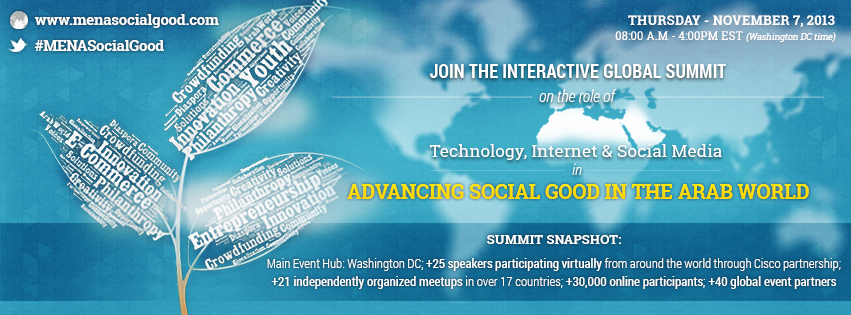Originally published on November 4th, Huffington Post Section of Social Entrepreneurship in Partnership with Schwab Foundation
What will tackle the biggest social, health or economic problems in each country? Philanthropic missions? Innovative technology? Or a version of Bill Gates in each region of the world?
One lesson to take away from the 2008 Global Financial Crisis is that no country is too rich for problems — nor is protected from thedownturns faced by others, like Turkey. Back in September, Mashable partnered with the Bill & Melinda Gates Foundation and the United Nations to embrace this discussion of technology and philanthropy in the “Social Good Summit.” But, while combing through the tweets, not much discussion about how “Social Good” has taken root in the Arab World. This was odd since philanthropy in the MENA region is as old as the MENA region itself. Technology, on the other hand, has made more inroads further East.
Yet, lately, for the Middle East & North Africa region, a long list of big-name institutions, like the Milken Institute, and investors have been recommending that investing in MENA’s technology sector may be the way to address their unemployment and infrastructural problems — even the political unrest. Meanwhile, a variety of NGOs are establishing themselves in the MENA region, or regrouping, to better fix the infrastructural problems they see — and maybe the unemployment. So will both of these paths, technology and philanthropy, continue to operate independently? Or will they move towards each other like awkward dance partners — or choreograph something better?
According to a World Economic Forum report, the UAE and Qatar lead the Arab World in leveraging information technology for growth. That’s great. There is a downside, though. The UAE and Qatar do not represent the bulk of the Middle East & North Africa region when it comes to country finances. Like Saudi Arabia, they are oil-rich economies and can more easily invest in the ICT sector.
Nonetheless, China has noted the Arab countries’ potential for technological growth. Actually, China has more than “noted” — Chinese businesses have invested over $1.4 billion in Qatar, Jordan, Kuwait, and Egypt, for example.
Will Investing in MENA Technology Fuel Philanthropy?
Technology is a sector that requires huge capital investment — on top of millions of dollars (or dinars) in research and development projects. This was even more evident when young Egyptians presented their “social good” projects as Gabr Fellows to the Arab American Institute and the Shafik Gabr Foundation. Two of the team projects leveraged technology space toward a “social good” mission. One focused on micro-health clinics. The other focused on renewable energy. Both projects will require more investment that the other Gabr Fellows’ proposals — but will probably do more to address infrastructural and economic problems mentioned earlier.
Big-time philanthropists, like Bill Gates, lend their technology to achieve “social good.” So how does philanthropy intersect with technology — a sector that requires huge capital investment? One idea is that technology and philanthropy may operate better within a social enterprise model that rewards talent — achieving “social good” together. However these two sectors combine, under whomever, below include some key lessons learned from the Chicago Booth School event held in the 1776 Campus in Washington, D.C.
1776 was established in January 2013 as a hub to support innovative startups. In Jordan, the Oasis500 initiative operates in a similar way, but it targets only startups in the ICT sector. Similarly, Egypt has Flat6Labs and its own culture where philanthropy, venture capital investments, and technology link up where public sector hovers.
- Social entrepreneurship risks failure at this point: if no succession plan or depends on ONE person whose ego gets in the way.
- Doing “social good” work should not mean you earn low salary. Social enterprises should pay more to retain talent because searching and training them are costly.
See a pattern of learning how to be a “Changemaker” at a very young age — won’t stop until they make the change.~ Lucy Perkins, Leadership Group Member, Ashoka
On Thursday, November 7, Al-Mubadarah (The Arab Empowerment Initiative) will host the first summit on philanthropy and technology in Washington, D.C.: MENA + SocialGood that has also organized virtual meetups for those participating in the Arab World. Speakers will include Rama Chakaki of Barakabits, Mona Abusulayman (philanthropist), Ahmed El-Alfi of Sawari Ventures, Ossama Hassanein of Techwadi, Ahmed Alhendawi (United Nations) among others. Follow the discussion of #MENASocialGood. See if there is an Arab version of Bill Gates — one who used the technology platform to increase philanthropy — or if there is an Arab changemaker who can use the philanthropy vision to increase technology. Either way, it’s all #MENASocialGood. Can’t wait to tweet back at your comments Thursday!


